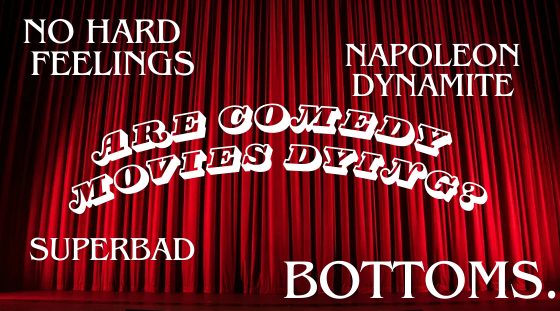The 2000s witnessed the release of a plethora of blockbuster comedy films, from “Napoleon Dynamite” to “Superbad.” These movies defined an entire generation of comedy. Fast-forward two decades, comedies seem to have hit rock bottom. This begs the question: what caused such a drastic shift?
Comedy has been a cornerstone of cinema, dating back to the early 1910s with pioneers like Charlie Chaplin. Despite the ever-changing landscape of film, from samurais to westerns, 80s horror to 90s action, comedy has consistently drawn audiences.
Now, in 2024, pure comedies are struggling to secure theatrical releases. Instead, we’ve seen a rise in hybrid genres, such as Jordan Peele’s comedy/horror films “Get Out,” “Us” and “Nope.” Yet pure comedies, made with the sole intention of eliciting laughter, are slowly becoming a fossil of many theaters.
According to World of Reel, comedies accounted for approximately 20 percent of all films produced in 1997. By 2003, this figure had risen to 21.4 percent. However, in 2022, comedies made up a mere 6 percent of all films produced, including family films as pure comedies, though many would consider this its own genre.
One possible explanation for such an insane drop off in the number of comedy movies being released is the shift in political climates over the years. It’s no secret that it’s harder to get away with as much as you once were allowed to.
“I think it’s time for a good old-fashioned laugh and it really is hard to make a comedy where you’re not offending people,” explained Jennifer Lawrence in an interview with Variety during a media tour for her 2023 film “No Hard Feelings.”
However, many argue this isn’t a sufficient explanation. It’s possible to make comedy films that are both humorous and politically correct. Emma Seligman’s 2023 film, “Bottoms,” serves as a prime example, receiving acclaim from both critics and audiences during its extremely brief theatrical run.
As much as people want to point their fingers at “cancel culture” for killing comedies, that’s not exactly the full truth, and Seligman proved that.
So, if great, unique, politically correct comedy films can still be made, what really caused the stark decline in comedies?
The decline in comedies can’t be pinned down to one single culprit; rather, it’s been affected by the perfect storm of evolving tastes, rising streaming titans, and the changing dynamics of the film industry itself.
The first aspect to consider is the saturation of the comedy market. In the early 2000s, there was a hunger for fresh, boundary-pushing humor. Over time, this was desired less and less by audiences and people became more accustomed to certain tropes and formulas. What once felt groundbreaking now seems tired and cliche.
Moreover, the globalization of films has led to a broader target audience. What resonates with audiences in one part of the world might not translate well into another. This is especially true with comedies. This has prompted filmmakers to prioritize more universally appealing narratives, often at the expense of smaller genres like comedy.
Additionally, and most importantly, movies are expensive to make. Producing a comedy film requires a substantial investment in talent, production, and marketing. With studios increasingly focused on big-budget blockbusters and established franchises that promise higher returns, smaller comedy projects often get sidelined in favor of more easily marketed blockbuster films.
It’s not all doom and gloom for comedy enthusiasts. The digital age has given filmmakers a whole new outlet to release projects, allowing independent creators to bypass traditional roadblocks and reach audiences directly through platforms like YouTube and TikTok. This has sparked a new resurgence of comedy that relies more on authenticity and relatability.
While the landscape for traditional comedy films may have shifted, the spirit of comedy remains alive and well in various different forms. Comedies are less likely to get a chance in theaters, but they’re still consistently being released exclusively onto streaming services.
We saw a big release in March 2024 when director Peter Farrely, known for his work on “Dumb & Dumber,” released his new comedy film “Ricky Stanicky” directly to Prime Video. Ten years ago it wouldn’t have been surprising to see something like “Ricky Stanicky” in theaters. It may have even done well in the box office, but comedy has taken a new form.
At the end of the day, as long as there are creators willing to push boundaries and audiences hungry for laughter, the art of comedy will continue to evolve and adapt to cinemas’ ever-changing landscape.







